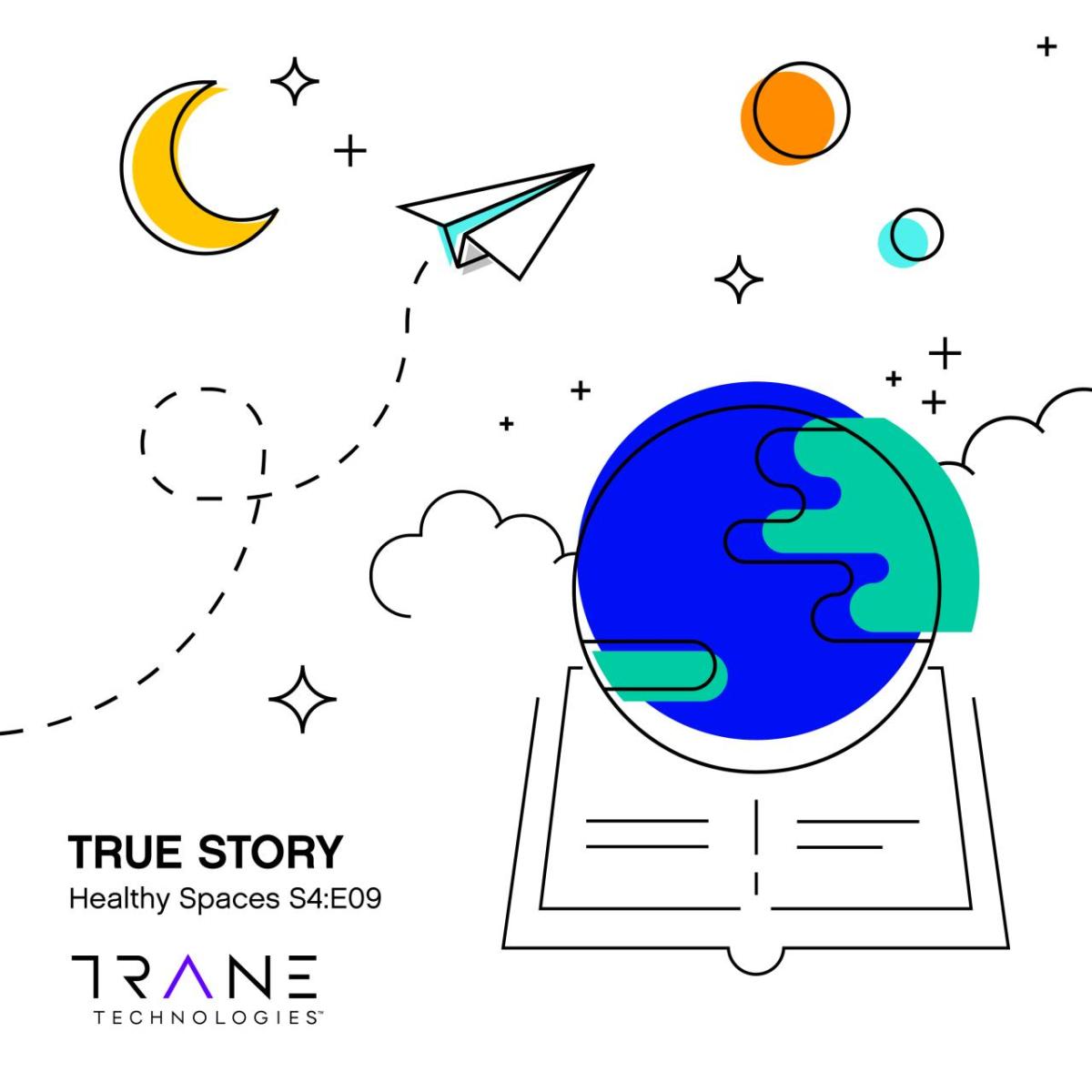Healthy Spaces Podcast: Season 4, Episode 9 - True Story
Rhea-AI Summary
Trane Technologies has released the latest episode of its Healthy Spaces Podcast, featuring a discussion on the importance of strategic communications in advancing sustainability initiatives. Hosted by Dominique Silva and Scott Tew, the episode includes insights from Suzanne Shelton of Shelton Group and Carrie Ruddy, Chief Communications and Marketing Officer at Trane Technologies.
The conversation highlights the role of authentic storytelling in making sustainability relatable and impactful. Key topics include addressing climate change concerns, using plain language to communicate effectively, and embedding sustainability in business strategies. The episode is available on platforms like Apple Podcasts, Spotify, and YouTube.
Listeners are encouraged to share their stories on how they are building healthy spaces in their organizations or communities. Trane Technologies emphasizes that every job is a sustainability job and aims to showcase innovative approaches to creating sustainable environments.
Positive
- None.
Negative
- None.
News Market Reaction
On the day this news was published, TT declined 0.80%, reflecting a mild negative market reaction.
Data tracked by StockTitan Argus on the day of publication.
NORTHAMPTON, MA / ACCESSWIRE / September 18, 2024 / Trane Technologies:
The power of authenticity in sustainability communications.
As companies work to address the challenge of sustainability, they face a secondary challenge along the way: How do they capture and share that work? Effective communications are essential in transforming sustainability from a buzzword into a movement.
In this episode of the Healthy Spaces podcast, host Scott Tew facilitates a conversation between Suzanne Shelton, Founder of Shelton Group and Senior Partner with ERM Shelton, and Carrie Ruddy, Chief Communications and Marketing Officer at Trane Technologies, about the role of strategic communications in addressing climate on a broader, more impactful scale.
Listen to the full episode to learn more from two communications and marketing experts about the stories that connect, the importance of authenticity and audience, and why sustainability communications are at their most effective when they make the complex simple, the abstract tangible, and the global, personal.
Episode Guests
Host: Dominique Silva, Marketing Leader EMEA, Trane Technologies
Host: Scott Tew, VP Sustainability, Trane Technologies
Suzanne Shelton, Founder of Shelton Group and Senior Partner, ERM Shelton
Carrie Ruddy, Chief Communications and Marketing Officer, Trane Technologies
Subscribe
Find all episodes on your favorite podcast platforms:
Apple Podcasts
Spotify
YouTube
Amazon Music
How are you building healthy spaces in your organization or community?
Share your story with us and learn more about the Healthy Spaces Podcast.
Transcript
[00:00:02] Dominique: Storytelling is not just a tool. It's a superpower in the world of sustainability. But in a world where data is abundant, how do we cut through the jargon and then communicate the urgency and impact of sustainable practices? How do we make the complex simple, the abstract tangible, and the global, personal?
[00:00:22] Carrie: One thing that I've seen in a lot of research and our own communications is plain speak and real language. You know, when you use terms that people don't really understand or may not relate to, it just becomes easier to say like, oh yeah, all that stuff. That's you know, not me. That's not important. But if you come down to again what people care about, it's using less water, using less energy, saving on energy cost. It's about taking care of our people.
[00:00:52] Suzanne: One of the things we do is we survey people all around the world twice a year. We have for 18 years to understand their beliefs and expectations around a whole range of people and planet issues.
[00:01:02] Suzanne: And what I can tell you is the average human is not all caught up in all that political stuff. The average human wants big companies to take care of the planet. The average human feels a little freaked out about climate change and the impacts on not only their lives, but their children's lives.
[00:01:16] Dominique: You just heard from Carrie Ruddy, Chief Communications and Marketing Officer for Trane Technologies. And Suzanne Shelton, founder of Shelton Group and senior partner at ERM Shelton.
[00:01:29] Dominique: I'm Dominique Silva, and you're listening to Healthy Spaces, the podcast exploring how technology and innovation are transforming the spaces where we live, work, learn, and play. In today's episode, we're going straight to the experts on how to turn sustainability from a buzzword into a movement that everyone can feel part of.
[00:01:49] Dominique: We'll discuss the evolution of communicating in the sustainability space, how to deal with skepticism, and how drilling down into data and what people really care about helps craft narratives that connect with customers on a deeper level.
[00:02:11] Dominique: Our VP of Sustainability, Scott Tew, starts the conversation by asking Carrie how she counsels leaders in her role as Chief Communications and Marketing Officer.
[00:02:22] Carrie: The role of a communicator or a marketer is all about really understanding the audience and sharing a story or a message that is relevant to that audience and that can help meet a need.
[00:02:34] Carrie: For us, I think what's critical is really being able to link it to strategy and show how sustainability is embedded in the business and the strategy of the company. I think that makes it really much more compelling. And the other thing is around really being authentic. And, you know, I think that has been, you know, a real currency of ours at Trane Technologies.
[00:02:59] Carrie: We have such depth in terms of our action and our data that we're able to tell a really authentic and compelling story. It's not just words. It's also what we're doing every day and the stories and data to back that up. And I think that helps us make it more real. So, I think those are two things that chief communications officers should really be bringing to leadership.
[00:03:23] Scott: Yeah, it's nice that this whole evolution of making it real and yet keeping it focused on the right priorities. Suzanne, you and I have known each other for like 15 years or so. And you've seen this evolution happen from another perspective.
[00:03:39] Suzanne: Maybe in some ways y'all it's a little bit like politics.
[00:03:41] Suzanne: It feels like the pendulums just swing this way or that way in the aughts, companies were like, what do you mean? I'm going to talk about sustainability. I'm not spending money on that. And then when it became popular and surveys kept coming back going, no, people really want to hear about it. Then everybody started talking about it, but maybe Carrie, in a way that was not aligned with purpose, was not aligned with strategy, and therefore was not authentic.
[00:04:04] Suzanne: So, we saw a lot of greenwashing happen through the, through the teens. And so, it has created this new phenomenon. So, swinging back the other way, called, that we call green hushing. So, we see a lot of chief communication officers that are in kind of a vice grip, like, oh my gosh, I see the data.
[00:04:20] Suzanne: I see that people want us to talk about it, but I'm so afraid we're going to get in trouble. We're going to step in a hole. Maybe the better thing to do is just stay quiet.
[00:04:28] Scott: Well, let's talk about the skepticism though, Suzanne, because, you know, there are pockets of skepticism out there from investors to employees, to shareholders. So how do you counsel companies who have leaders that are wondering how to deal with skepticism?
[00:04:43] Suzanne: I'm going to go back to what Carrie said. It really is about understanding who are your stakeholders, who are your most important audiences, and what do they care about. One of the things we do is we survey people all around the world twice a year. We have for 18 years to understand their beliefs and expectations around a whole range of people and planet issues.
[00:05:00] Suzanne: And what I can tell you is the average human is not all caught up in all that political stuff. The average human wants big companies to take care of the planet. The average human feels a little freaked out about climate change and the impacts on not only their lives, but their children's lives. So, this is not abstract anymore.
[00:05:15] Suzanne: It's not about future generations. It's about my kids. Like, what are we leaving behind for them?
[00:05:21] Carrie: You know, one thing that I've seen in a lot of research, and I've seen work in a lot of our own communications is plain speak and real language. And I think, you know, when you use terms that people don't really understand or may not relate to, it just becomes easier to say like, oh yeah, all that stuff. That's, you know, not me. That's not important. But if you kind of come down to again, what people care about and talk about things like using less water, using less energy, saving on energy costs, it's about taking care of our people. It's about good jobs and good careers and good income, right?
[00:06:00] Carrie: Those are things that we can all get behind. And so, I think there's a shift right now in how we talk about ESG and really putting that kind of plain language around it will help us be more effective.
[00:06:13] Scott: Carrie, you have two feet in the communications world, one's for an internal employee audience, the others for audiences outside the company.
[00:06:21] Scott: How do you make sure that you're hitting all of those audiences with the messaging and storytelling that is most important to them?
[00:06:29] Carrie: I think it is really understanding all those different audiences, understanding their needs and what's important to them and really balancing that. But at the same time, staying true to the purpose, the strategy and really the values of the company. Then that is sort of your guide rails, it keeps things focused. You know, I think there's opportunities to turn up the dial on messages for some audiences and turn it down for others as you know what, what resonates with them. And so, I think that's what our team, you know, really thinks about as we're communicating, whether it's investors, customers, employees, or potential of all of those audiences.
[00:07:13] Carrie: We're really trying to understand what matters and how we can help them with what matters most.
[00:07:19] Suzanne: What we do have in common is there's a lot of concern. Like there are a lot of issues to be concerned about right now and we track a variety of different issues, and we see the same kinds of concerns every year.
[00:07:28] Suzanne: Some things change like immigration or inflation or guns or like we see something that might have been in fourth place last year moves up to second place but broadly like it's not like people are like, oh I'm only concerned about that one thing of the 20 things we test. People are like, you know, top box on all of them.
[00:07:44] Suzanne: Like I'm so concerned about all these things. So, what holds us together is we're all pretty freaked out about a lot of things.
[00:07:50] Suzanne: So, you really do need to try to understand your audience to see, do I need to skew my messaging a little bit more? Like we're doing this great thing and it's not such a new idea.
[00:7:59] Suzanne: We were doing this 20, 30 years ago. We've just made it better. Or do you go, we're doing this great thing and let me tell you what it's going to mean for the future.
[00:8:07] Suzanne: That said, again, remember what we have in common is we're concerned about a lot of things. So, I think as companies are coming forward and talking about what are they doing, and that authentically relates to their purpose, their brand, and their strategy, you're going to be just fine.
[00:8:23] Dominique: People are worried about a lot of different things. And while those concerns might change, the overall worry is always there. And for companies, being authentic and addressing these concerns is what will really resonate with their audience. So, we asked Suzanne, what kind of content is really clicking with different audiences these days?
[00:8:50] Suzanne: So, I'm going to use the consumer word. We've conditioned consumers to care most about recycling because that's the message we've given for 40 years. Be green, recycle! So, when you can talk about recyclability, recycled content, consumers really care an awful lot about that. I can tell you what all humans care about the most is how do companies treat their employees.
[00:9:09] Suzanne: We've seen it for years and we saw it spike during COVID. Like they cannot consider a company to be good, meaning a company that they would want to buy from or work for. They can't consider them to be good if they have a bad track record on how they take care of their employees. No matter what other good things in the world they might be doing.
[00:9:25] Suzanne: So that is thing number one. You got to take care of your employees, and you got to tell that story.
[00:9:29] Suzanne: So, what people care about, how you treat your employees, they care about recycling, they care about the content of materials. They do care about climate. They are less sophisticated in their understanding of how does their energy use contribute to climate change and what can I do as a person? So, I think there's a lot more messaging and education and communications that that companies like Trane Technologies can actually take a lead on to help folks understand what are the ways in which we can increase efficiency and therefore decrease the impacts of climate change.
[00:9:56] Carrie: Suzanne, I'm glad you hit on that because, you know, one thing that we're thinking about in our marketing is how we can educate the market around what's possible. And so, you know, one big area that we're working on and very excited about is electrification of heating. Traditionally, if you look at heating and cooling in large buildings, you've got a chiller plant for cooling.
[00:10:22] Carrie: You've got a boiler for heating, which is fossil fuel powered. And today, you know, we've got technology that can bring all that together into one electrified thermal system. And it's so much more efficient, three to four times more efficient than traditional ways of heating and cooling.
[00:10:38] Carrie: And so, it's got just real power to help our customers be more environmentally responsible, but also, you know, save on their own energy and operations. But today if a customer has a problem with their heating, they might be thinking like, oh, I got to go get a new boiler. So, how do we educate the market on what's possible and make sure that they're thinking about Trane Technologies and innovation like we have when they have a need.
[00:11:07] Suzanne: And I'm going to drill further on your example because we've done a lot of work in the space. And what we see is there is a segment of the market out there that wants to hear about how moving to an electric, all electric source of heating and cooling, how that's better for the planet.
[00:11:21] Suzanne: But it's a little piece of the market. What plays a lot better is what you just said. It's two for one. Like you get both heating and cooling in one system. It's more efficient. It saves you money in the long run. Those are actually the messages that work better. So sometimes companies have a tendency to only focus on those messages and then not talk about the planet.
[00:11:37] Suzanne: Our point of view is, you do need to get that, that impact message in there. It's just not your lead message. But it does need to be part of the story because then that's how people will communicate the story to their friends and family is, oh, I did this thing and it's awesome. It's more efficient. It's going to save me money.
[00:11:50] Suzanne: And you know what? It's actually better for the planet. People want to be able to portray themselves as good actors.
[00:11:56] Scott: Let's talk about the formal work of that. Companies have, for a hundred years, have been putting out annual revenue reports, sort of their financial progress. But about two decades ago, companies started putting out an environmental report, and some companies put out a two-page one, some had a 20-page one.
[00:12:13] Scott: Suzanne has probably, in her firm, helped a lot of companies put out their reports over the years. And Carrie, you've certainly been part of those. Now companies are all putting out reports. We call them all different things. So, where's all this headed? These extra reports companies put out. Some call it ESG. Some call it impact. Where are we headed on these disclosures?
[00:12:37] Suzanne: Because of the regulations, I'm thinking specifically of CSRD coming out of Europe. I think we are going to see the, I'm going to put it in air quotes, the "sustainability report," sort of go the way of the 10K. It will be charts and tables and numbers.
[00:12:52] Suzanne: And I actually think that's a good thing because I think a lot of companies conflate disclosure and communications, like as if our report is communications. And the report is a disclosure document. It only really becomes communications if we do it as you do it, which is let's take all those great stories and let's leverage them all year long.
[00:13:12] Suzanne: Let's put them out on social media. Let's put them in sales presentations. Let's put them on conference stages. So, if we think about the report really as a content hub that allows us to get stories out, that piece isn't going to change. It's just, it might not be that there's a report document. The report may become a bunch of tables and charts.
[00:13:31] Suzanne: But there will still be all those stories because companies are doing amazing things all year long, and people want to hear about that. So, we'll just have to rethink of these of reporting, not as disclosure so much as no, this is a communications program, and we need to think about it that way. How do we want to communicate the good things we're doing beyond the charts and tables that we're going to be required to put forward?
[00:13:56] Dominique: A big thank you to Carrie and Suzanne for joining us on today's episode, where we discussed the power of authenticity to connect with audiences about creating a more sustainable future. At Trane Technologies, we believe that every job is a sustainability job, and every role provides an opportunity for impact.
[00:14:16] Dominique: That's why each week on the podcast, we'll feature how someone is building healthy spaces in their organization or community. This week, we're sharing a submission from Philip V. Ray, proposal support manager in Markham, Ontario. Philip is helping create a more sustainable workplace by streamlining the proposal process with innovative digital solutions.
[00:14:40] Dominique: He's ensuring that navigating massive documents is faster, more focused and minimizing distraction. Philip is also applying lean methods to identify and eliminate inefficiencies. His approach not only boosts productivity, but also contributes to a more effective and mentally engaging work environment.
[00:15:01] Dominique: Thank you, Philip, for your innovative approach to reducing waste. Would you like to share how you're building healthy spaces too? To share your story, visit us at TraneTechnologies.com/Healthy Spaces Podcast. Thank you for listening to the Healthy Spaces Podcast, where we explore how climate technology and innovation are transforming the spaces where we live, work, learn and play.
[00:15:27] Dominique: If you want to find out more about our conversation today, make sure you check out the show notes and remember to rate and review us on your favorite podcast app. That's it for today's episode. We'll see you next time.

View additional multimedia and more ESG storytelling from Trane Technologies on 3blmedia.com.
Contact Info:
Spokesperson: Trane Technologies
Website: https://www.3blmedia.com/profiles/trane-technologies
Email: info@3blmedia.com
SOURCE: Trane Technologies
View the original press release on accesswire.com







